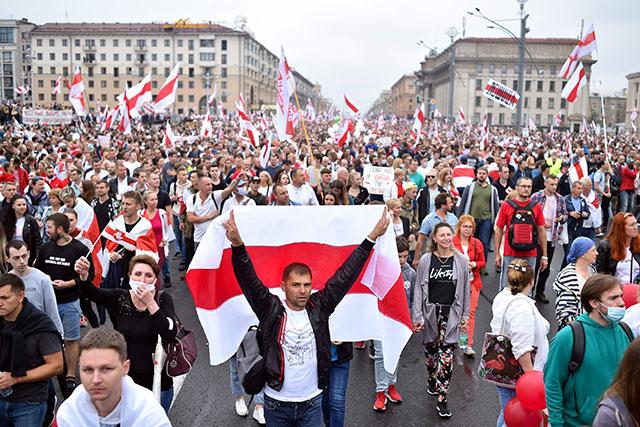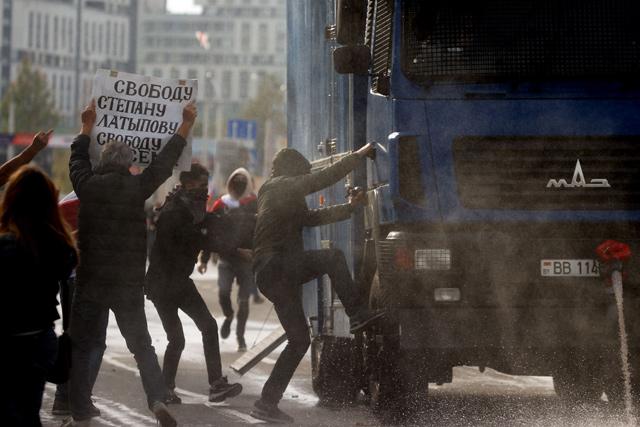You are here
Belarus opposition restart protests as crackdown widens
By AFP - Mar 25,2021 - Last updated at Mar 25,2021

In this file photo taken on August 23, 2020 opposition supporters rally to protest against disputed presidential elections results in Minsk (AFP photo)
MINSK — Scattered groups of protesters in Belarus on Thursday tried to breathe life into a movement against President Alexander Lukashenko that fizzled out in the face of a severe crackdown.
The authorities responded by moving military vehicles into the centre of the capital Minsk, according to videos circulating on social media and published by local media, and detaining activists, rights groups reported. Rallies erupted in the ex-Soviet country last August after Lukashenko claimed a sixth term in a vote the opposition and Western diplomats said was rigged.
But a sustained police crackdown saw weekly mass demonstrations in city centres peter out by the end of the year, with thousands of protesters detained and several killed.
The opposition has since changed tactics, calling for supporters to gather in small groups in every district.
The Nexta Telegram channel, which has mobilised and coordinated demonstrations, urged protesters to march through courtyards and organise flash mobs on Thursday.
Images published by local media showed small groups marching through Minsk waving red-and-white flags -- a symbol of the Belarus opposition -- and official red-and-green flags draped over state buildings. The Viasna human rights group said that as of 6 pm (15:00 GMT) police had detained at least 20 activists nationwide.
Nexta also called on drivers across the country to sound their horns at 6:30 pm and for a nationwide firework salute to end the day at 9:00 pm. "We want to declare March 25 the day when the cities are ours!" Nexta wrote. 'Belarus we deserve'
The resumption of the protests coincides with Freedom Day in Belarus, which the opposition marks each year on the anniversary of a declaration of independence in 1918.
Officials have said the planned protests are illegal and moved to crack down on dissent this week, accusing a group representing Polish people in Belarus of stirring up racial hatred and the "rehabilitation of Nazism". On Wednesday, the head of the Union of Poles in Belarus, Anzhelika Boris, was arrested and sentenced to 15 days in prison.
Police on Thursday then searched the group's offices, the homes of its activists and at least one Polish school, and detained board member Andrzej Poczobut.
In a statement Thursday EU foreign policy chief Josep Borrell called on Belarus to release the group's members "along with all political prisoners currently detained".
Belarus's relations with Poland deteriorated after the EU member sheltered activists -- including the coordinators of Nexta -- who fled across the border to escape the crackdown.
Other critics, including opposition leader Svetlana Tikhanovskaya, fled to Lithuania after the August vote.
She has since lobbied Western governments to support her call for new elections in a country ruled by Lukashenko since 1994.
"I wish for all of us to meet next March 25 in the Belarus we deserve -- in a country where the law is respected, rights are respected and the people are respected," Tikhanovskaya wrote on her Telegram channel Thursday. Western governments have slapped sanctions on Lukashenko and his allies and say political novice Tikhanovskaya was the true winner of the vote. 'Second wave'
EU Baltic states Lithuania, Latvia and Estonia on Thursday expanded sanctions against Belarus by imposing travel bans on more than 100 officials. "The regime's supporters must realise that the response to the brutal use of force against peaceful citizens will be very strict and clear," Lithuanian Foreign Minister Gabrielius Landsbergis said in a statement. Lukashenko, backed by Russian President Vladimir Putin, has claimed to have overcome a revolution directed by the West. More than 400 people have been given lengthy jail terms over the protests. The crackdown has instilled fear and dampened risk-taking even in those "very keen on changes", said Alexander Klaskovsky, a Belarusian political scientist.
Nexta has also called for mass protests on Saturday, casting it as "the day we start the second wave of street protests".
"Get ready to return to your city centres," Nexta wrote.
Related Articles
MINSK — More than 700 people were jailed following latest anti-government protests in Belarus, the interior ministry said on Monday, as ange
MINSK — Belarusian police on Sunday used water cannon to disperse a rally in Minsk as tens of thousands of demonstrators took to the streets
MINSK — Opposition protesters in Belarus took to the streets of capital Minsk on Sunday in the latest of three months of demonstrations agai

















